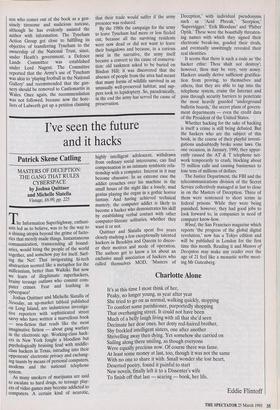I've seen the future and it hacks
Patrick Skene Catling
MASTERS OF DECEPTION: THE GANG THAT RULES CYBERSPACE by Joshua Quittner and Michelle Slatella Vintage, £699, pp. 225 The Information Superhighway, enthusi- asts led us to believe, was to be the way to a shining utopia beyond the grime of facto- ries that merely made things. Instantaneous communication, transcending all bound- aries, would bring the people of the world together, and somehow pay for itself. Surf- ing the Net That invigorating hi-tech abstraction seemed like a metaphor for the millennium, better than Waikiki. But now we learn of illegitimate superhackers, brainy teenage outlaws who commit com- puter crimes. Fear and loathing in cyberspace! Joshua Quittner and Michelle Slatalla of Newsday, an up-market tabloid published on Long Island, are industrious investiga- tive reporters with sophisticated street savvy who have written a marvellous book — non-fiction that reads like the most imaginative fiction — about gang warfare in the electronic age. Working-class hack- ers in New York fought a bloodless but Psychologically bruising feud with middle- class hackers in Texas, intruding into their opponents' electronic privacy and exchang- ing taunts by means of personal computers, modems and the national telephone system.
As many smokers of marijuana are said to escalate to hard drugs, so teenage play- ers of video games may become addicted to computers. A certain kind of neurotic, highly intelligent adolescent, withdrawn from ordinary social intercourse, can find compensation in an intimate symbiotic rela- tionship with a computer. Interest in it may become obsessive. In an extreme case the addict crouches over his machine in the small hours of the night like a lonely, mad genius playing the organ in a gothic horror fantasy. And having achieved technical mastery, the computer addict is likely to become a hacker who demonstrates his skill by establishing verbal contact with other computer-literate solitaries, whether they want it or not.
Quittner and Slatalla spent five years closely studying a few exceptionally talented hackers in Brooklyn and Queens to discov- er their motives and mode of operation. The authors got to know a lot about an exclusive small association of hackers who called themselves MOD, 'Masters of Deception,' with individual pseudonyms such as 'Acid Phreak,"Scorpion,' `Supernigger,"Erik Bloodaxe' and Thiber Optik.' These were the boastfully threaten- ing names with which they signed their electronic break-ins, goaded their rivals, and eventually unwittingly revealed their real identities.
It seems that there is such a code as 'the hacker ethic: Thou shalt not destroy'; however, thou may be very, very nosey. Hackers usually derive sufficient gratifica- tion from proving, to themselves and others, that they are able to tap into the telephone system, cruise the Internet and pass through security barriers to penetrate the most heavily guarded 'underground bulletin boards,' the secret plans of govern- ment departments — even the credit data of the President of the United States.
Whether hacking for the sake of hacking is itself a crime is still being debated. But the hackers who are the subject of this book, in the course of their playful investi- gations undoubtedly broke some laws. On one occasion, in January, 1990, they appar- ently caused the AT & T telephone net- work temporarily to crash, blocking about 75 million calls and causing businesses to lose tens of millions of dollars.
The Justice Department, the FBI and the telecommunications division of the Secret Service collectively managed at last to close in on the Masters of Deception. Three of them were sentenced to short terms in federal prisons. While they were being punished, however, they had good jobs to look forward to, in companies in need of computer know-how.
Wired, the San Francisco magazine which reports 'the progress of the global digital revolution,' now has a Tokyo edition and will be published in London for the first time this month. Reading it and Masters of Deception may make any reader over the age of 21 feel like a monastic scribe meet- ing Mr Gutenberg.


























































 Previous page
Previous page